The number of people told to self-isolate by the NHS app or directly from Test and Trace has fallen by 20 per cent in a week, official figures show.
Data laying bare how the ‘pingdemic’ has started to fizzle out revealed 610,000 quarantine alerts were sent in the week ending August 4, down from 759,000 the week before. But the drop was partly fuelled by the five per cent fall in cases.
The figures come ahead of the Government’s move to set double-jabbed adults and all children free from isolation rules on Monday.
Ministers have vowed to limit the disruption caused by the quarantine crisis, which saw supermarket shelves left empty because of a lack of staff in the supply chain. Bars and pubs also had to shut and trains were cancelled.
From next week, more than 33million people in England who have received both coronavirus vaccine doses will no longer have to self-isolate if someone they have been in contact with tests positive.
The restrictions will also be lifted for everyone aged under 18 as school bubbles are scrapped.
But ministers urged the double-jabbed to remain cautious if they get pinged and think about wearing a face mask in enclosed spaces and avoid others, particularly the elderly and those with health conditions.
Instead of having to isolate for up to ten days, those contacted by NHS Test and Trace or through the app will be advised to get a PCR test as soon as possible. They will not have to isolate while waiting for the result.
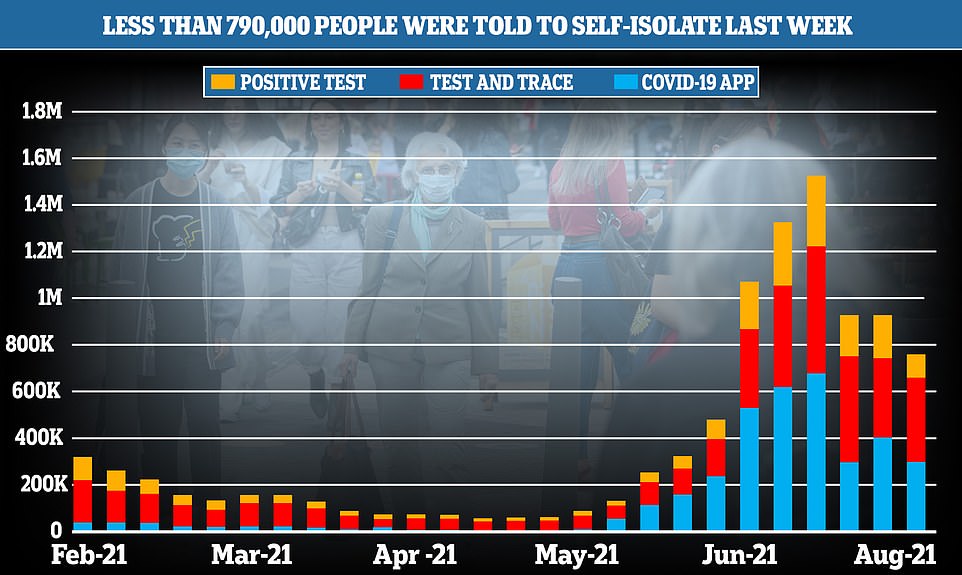
The number of people told to self-isolate by the NHS app or directly from Test and Trace has fallen by 20 per cent in a week

Pings made up around 40 per cent of all self-isolation alerts in the week ending August 4, with calls from Test and Trace making up 37 per cent and positive tests being 23 per cent
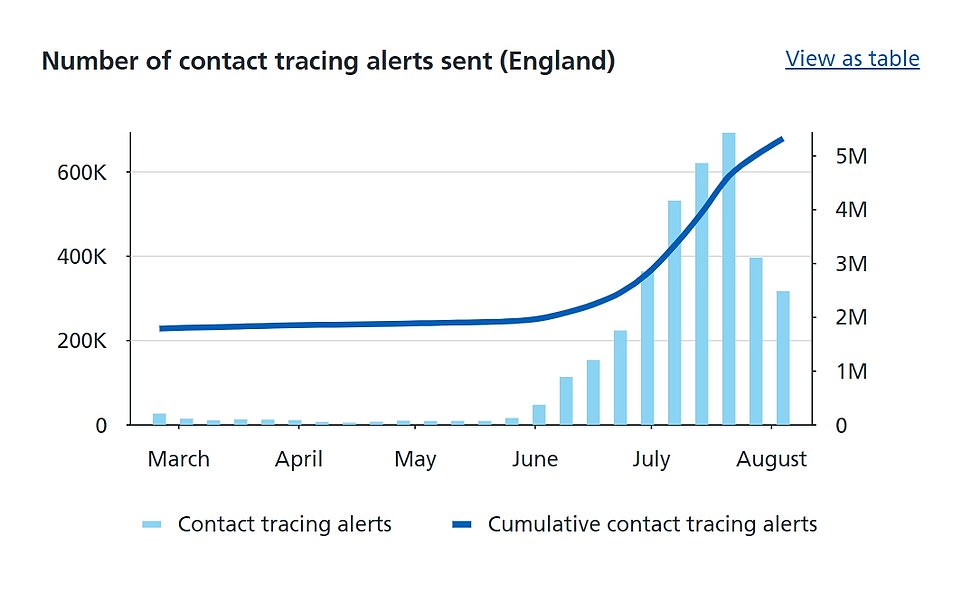
The number of people pinged by the NHS Covid-19 app in England fell 20 per cent to 310,887 in the week ending August 4, down from 388,265 the week before
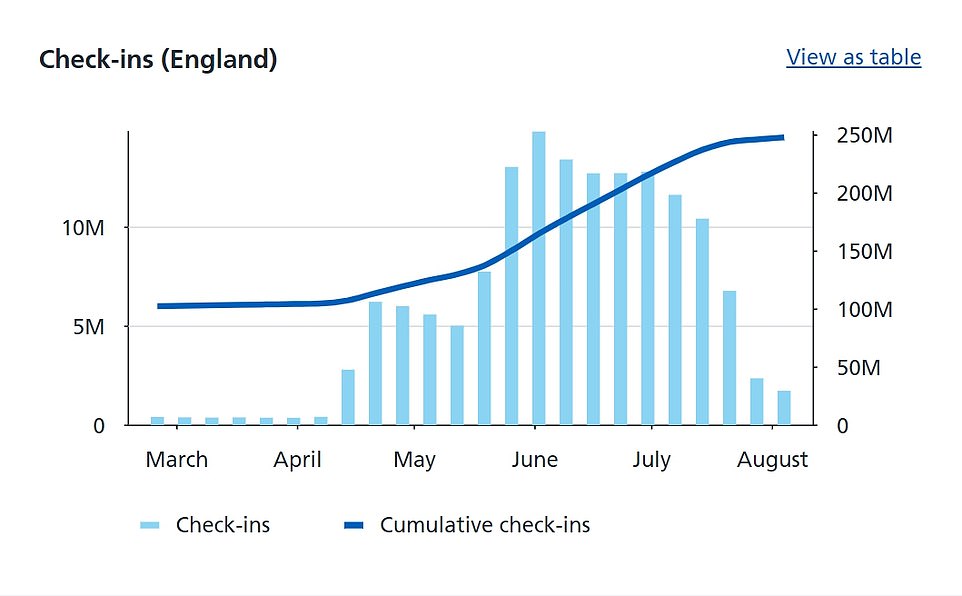
The drop-off in the number of venue check-ins using the app was similar during the week, falling 26 per cent from 2.3million to 1.7million
Number of people falling ill with Covid in Britain IS ticking upwards
The number of people falling ill with Covid every day in Britain has started to tick upwards, a symptom-tracking study has claimed.
Data from the ZOE Covid symptom study shows daily cases fell 2.12 per cent in the week ending August 7 from the 46,905 recorded the previous week.
But the rate of decline slowed down significantly, with experts suggesting infections could be levelling out or about to start rising again.
Professor Tim Spector, an epidemiologist at Kings College London and lead scientist on the study, said it is too early to tell whether the levelling off of cases will turn into another spike.
He warned the slight increase in cases in over-60s could be caused by ‘waning immunity’ among those jabbed earlier in the year but admitted it could be caused by more weddings and social events where the young and elderly have been mixing over summer.
Professor Spector said: ‘The decrease in cases that we saw last week appears to have faltered over the last few days, and we’re seeing signs of an uptick.’
Advertisement
NHS data today shows the number of people being pinged is already falling ahead of the move to reduce self-isolation next week.
Pings directly from the app — which is not legally enforceable — fell from 395,971 to 317,132 (19.9 per cent).
The drop also takes into account the tweak to the app at the start of August.
It now only finds close contacts from up to two days before infected people tested positive. Previously, it had trawled through five days of a user’s Bluetooth history.
The number of people reached by call handlers fell from 362,665 to 292,911 (19.2 per cent) while the number of people testing positive fell from 189,232 to 179,748 (five per cent).
In total, 789,791 isolation alerts were sent during the most recent week, when people testing positive are included. This was 16 per cent lower than last week’s number of 947,868.
However, the figure only refers to the amount of alerts — not people.
A single person may be identified by the app and call handlers before going on to test positive themselves — or be asked to isolate multiple times in the same month.
The figures come after weeks of chaos that have seen millions of workers forced to stay at home and children kept away from school even if they are not infected.
Crippling staff shortages have led to empty supermarket shelves and forced businesses including restaurants and pubs to shut their doors.
Figures a fortnight ago showed that a record 1.2million were told to quarantine in just one week including nearly 700,000 who were pinged by the Covid-19 app.
The new isolation rules for England come after similar changes were made in Wales last Saturday and in Scotland on Monday.
Double-jabbed adults will have to wait until 14 days after their second dose before they are exempted from the isolation rules for close contacts.


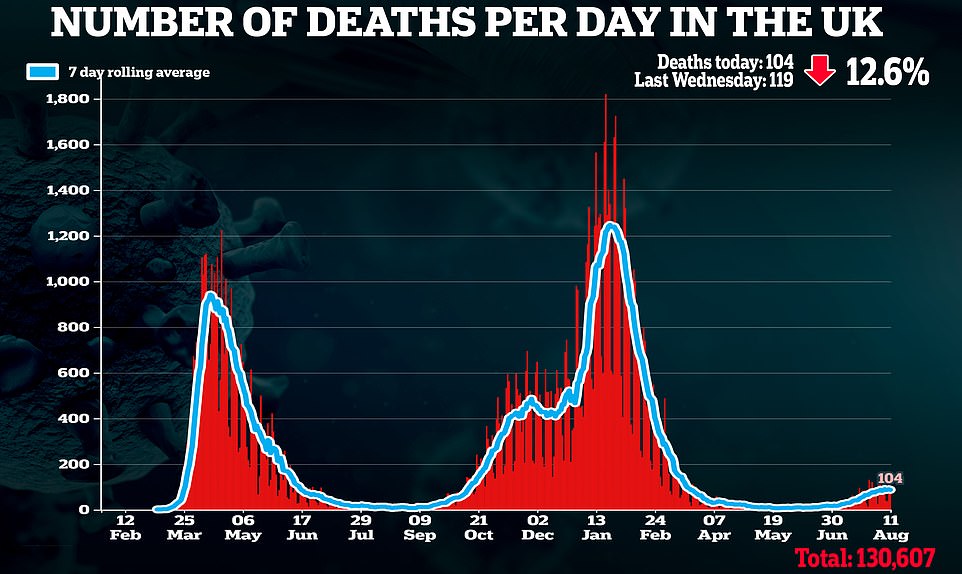
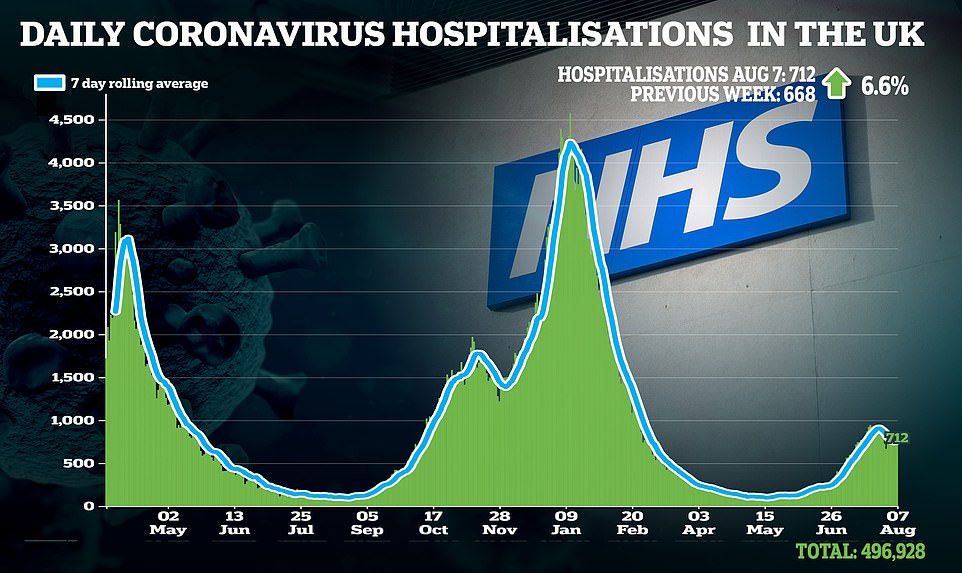
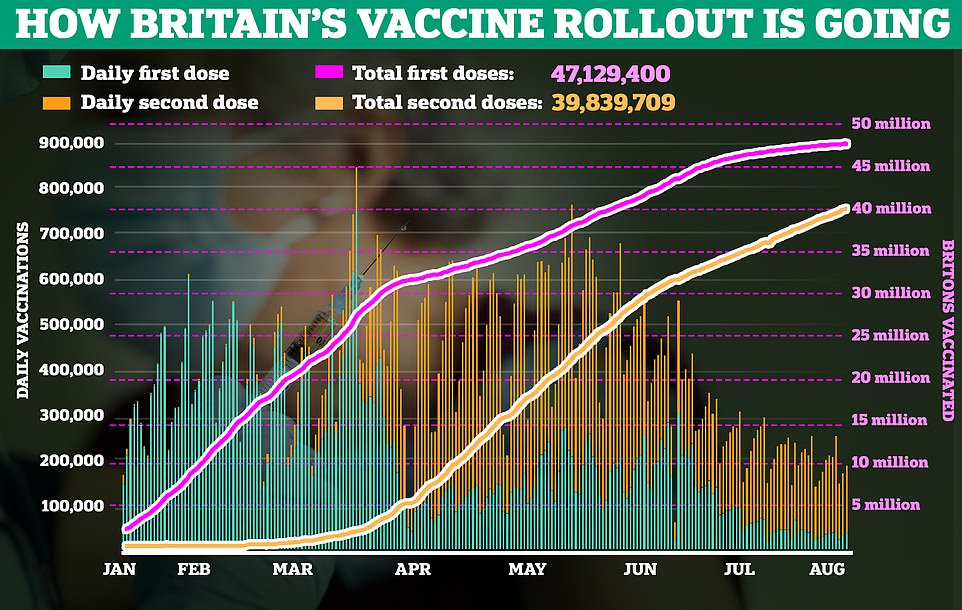
‘Stop mass testing and learn to live with virus’
Only the sick should be tested for coronavirus and all but the most vulnerable should be freed from blanket ‘control measures’, a Government expert has said.
Several leading scientists are setting out how Britain can shift towards ‘living with Covid’, calling for an end to disruptive measures such as mass testing and self-isolation.
Professor Andrew Hayward, a member of the Government’s New and Emerging Respiratory Virus Threats Advisory Group (Nervtag), and others yesterday backed calls to scrap routine testing of asymptomatic people.
He added that blanket lockdowns can no longer be justified as a way to control Covid and instead restrictions should only apply to the ‘most vulnerable’.
Professor Hayward, a University College London epidemiologist, said: ‘As we move into a sort of endemic rather than a pandemic situation then the potential harm that the virus can cause at the population level is much less.
‘So you can’t really justify such broad population-wide control measures and we tend to target the control measures more to those who are most vulnerable.’
Meanwhile, as another 29,612 cases and 104 deaths were reported yesterday, Professor Hayward warned that herd immunity was a ‘mythical’ goal.
He said: ‘I think it is a pretty distant prospect and we need to get used to the concept that this will become … a disease that is with us all the time and probably transmits seasonally, like influenza.’
Advertisement
Anyone who tests positive following a PCR test will still be legally required to isolate irrespective of their vaccination status or age.
Quarantine requirements for travellers returning from abroad will remain the same.
The removal of the isolation requirements for under-18s comes ahead of millions of pupils and students returning to school and college for the autumn term.
The bubbles system that has seen whole classes or year groups sent home will be axed.
Secondary school and college students will instead be required to take two on-site tests at the start of the new term, followed by twice weekly lateral flow tests at home.
Ministers have promised to review the testing requirements by the end of next month.
Health Secretary Sajid Javid said last night: ‘Asking the close contacts of people with Covid to self-isolate has played a critical role in helping us get this virus under control, and millions of people across the UK have made enormous sacrifices by doing this.
‘Every single one of these sacrifices has helped us protect the NHS and save lives.’
He added: ‘Getting two doses of a vaccine has tipped the odds in our favour and allowed us to safely reclaim our lost freedoms, and from Monday we can take another huge step back towards our normal lives by removing self-isolation requirements for double-jabbed people who are contacts of people with Covid-19.
‘Double-jabbed people who test positive will still need to self-isolate.’
Mr Javid continued: ‘Vaccines are what will bring this pandemic to an end – the wall of defence provided by the rollout is allowing us to get even closer to normal life.
‘If you haven’t already, please make sure you come forward for your jab at the earliest opportunity.’
Dr Jenny Harries, chief executive of the UK Health Security Agency, said: ‘Thanks to the huge success of the vaccine programme, we are able to ease self-isolation requirements for double-jabbed people and under-18s.
‘It is important that close contacts continue to come forward for a PCR test, in order to detect the virus and variants of concern.
‘Although two doses of vaccine will greatly reduce your own risk of becoming unwell with Covid-19, it is still possible to contract the virus and pass it to others.’
Dr Harries added: ‘So if you develop symptoms at any time – vaccinated or not – you should get a test and be very careful in your contact with others until you have received a negative test result.
Source link : https://www.dailymail.co.uk/news/article-9887223/Pingdemic-pain-eases-Alerts-sent-NHS-app-Test-Trace-call-handlers-fall-20.html











